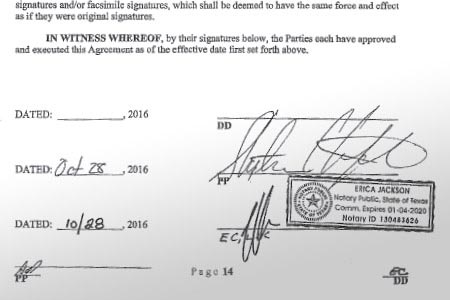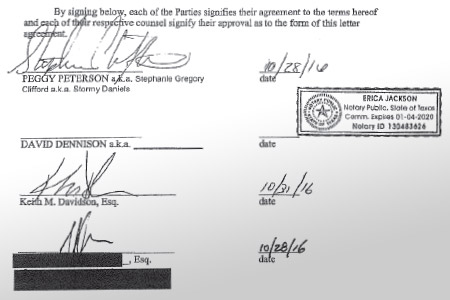
Updated 9-21-18. The Texas Secretary of State's office confirmed that the Notary's commission has been suspended for 3 months from August 8, 2018 through November 8, 2018. — The Editors
I often field questions from journalists when Notaries and notarizations get into the news. That happened this week when media reports surfaced that the Texas Secretary of State’s office is investigating the Notary involved in the $130,000 confidentiality agreement allegedly entered into in 2016 between an adult film actress and then-presidential candidate Donald Trump.
The Notary faces possible revocation of her commission due to the apparent failure to complete notarial certificates for the two documents involved in this matter. The case also illustrates the problems that can occur when notarizations are not performed correctly.
In this case, there are a number of questions about the so-called notarizations and whether the agreement is invalid as a result of problems with them.
The facts of the notarizations
The actress, known as Stormy Daniels (whose real name is Stephanie Clifford), has filed a suit in a California state court seeking to invalidate the confidentiality agreement because the President did not sign it.
Both the non-disclosure agreement supposedly signed by the actress and an accompanying side letter, which are attached as exhibits to the lawsuit, bear a Texas Notary seal affixed on the signature page of each of the 2 documents. Those seals are the only indications that the 2 documents were notarized. There is no Notary certificate or wording connected to those seals and no Notary signature anywhere on the documents.
The journalists who contacted me asked whether these “notarizations” were valid. After reviewing the actress’s lawsuit and the letter the Texas Secretary of State’s Office sent to the Notary, I immediately and firmly concluded the notarizations were invalid — although I cannot at this early time know for certain who was responsible for their faults.
The Notary Seal: Real or fake
The first issue that arises is whether the Notary seal affixed was an authentic seal belonging to the Notary named in the image and whether the Notary actually affixed the seal impressions on the 2 documents.
There have been numerous cases of wrongdoers forging or faking Notary seals to impersonate Notaries and/or forge notarizations. There also have been cases in which wrongdoers have stolen or otherwise acquired legitimate seals of Notaries and then used those misappropriated seals to impersonate Notaries and/or to forge notarizations. If these events occurred, the notarizations would be invalid.
Problem notarizations
If the real Notary in this situation affixed the seals, the “notarizations” were nevertheless faulty and invalid for several reasons.
First, the Notary did not prepare a notarial certificate as part of either notarization. Thus, the Notary did not identify the venue where the notarizations were performed, verify that the signer(s) were present at the time of the notarizations or verify which signatures were being notarized (since each document was signed by more than one individual).
Second, the Notary did not sign either notarization. The failure of the Notary to do those two things is absolutely fatal.
Next, the alleged notarizations were not dated by the Notary, so it is not possible to tell when the Notary seal was affixed — before, at the time of, or after the notarizations were performed. If the Notary seal were affixed before or after the documents were signed and/or without the knowledge of one or more of the document signers, the notarizations would be invalid.

Notary journal entries
Texas Notaries are required by law to prepare a Notary journal entry for each of their notarizations, so the Notary should have completed two journal entries for each signer to record the notarizations in this case. In fact, the Secretary of State has requested that the Notary provide copies of those entries as part of its complaint review process.
If no such entries were made, that omission will suggest very strongly the invalidity of the notarizations.
I would also like to know whether the Notary had any connection to any of the parties or attorneys involved in this case, how and why this Notary was chosen, whether anyone influenced the Notary to simply affix her seal to the documents, whether the Notary realized the “notarizations” were faulty at the time they were performed and whether the Notary was compensated for these two “notarizations” (and if so, by whom, and for how much).
An invalid agreement?
The real concern is whether the invalid notarizations make the confidentiality agreement invalid (although the actress’s California lawsuit, as of this time, does not make such a claim).
The agreement in question was a private contract that was not required by law to be notarized. Thus, it might seem that the faulty notarizations have no effect on the contract. However, to the contrary, it seems to me that a notarization either means something, or it does not.
I believe a notarization is a quite consequential act. It is an official act of a duly commissioned and impartial public officer — a Notary Public. The purpose of a notarization is to bring a detailed and thoughtful procedure to a transaction to help protect the parties against hasty decisions and to ensure the mental competence and willingness of the parties. None of that apparently happened in this case of the cavalier, minimal, and hollow action of the Notary.
When private parties mutually decide to have their transaction notarized, the notarization becomes a condition to their contract. If the notarization is invalid, the condition fails, and this failure either invalidates or at least substantially undermines the contract.
This view is the only interpretation that gives substance and worth to the act of notarization. Otherwise, notarization is reduced to a meaningless formality. Yet, over the centuries, there have been legions of authoritative endorsements of the values of the notarization of documents. And, I heartily agree with that view.
Michael Closen is Professor Emeritus at the John Marshall Law School in Chicago, Illinois. A respected consultant on model Notary statutes and legislation, Closen served on the drafting committees for The Notary Public Code of Professional Responsibility and various editions of the Model Notary Act, and recently authored Professor Closen's Notary Best Practices: Expert's Guide to Notarization of Documents.
Related Articles:
10 steps Notaries can take to avoid being sued
Notary Tip: 4 steps to take if you are sued